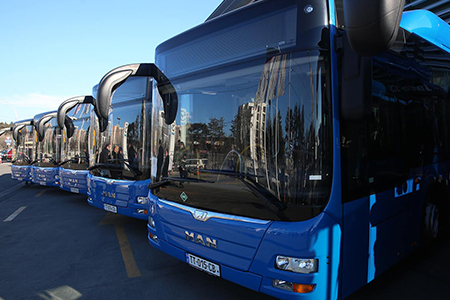Tbilisi to welcome 15 new buses in January

Georgia’s capital Tbilisi is continuing to modernise its public bus fleet by introducing 15 brand new buses that will begin operating on January 1, 2017.
The new buses will operate on route 51 - a popular bus route in Georgia's capital that serves the outlying districts.
The blue buses are more environmentally-friendly than the current buses that operate in Tbilisi, they run using compressed natural gas (CNG) and are able to lower so people in wheelchairs and with other disabilities can use the service.
The first blue buses arrived in Georgia on October 6, 2016. Since then the 10 new buses have been circulating on route 61, which travels through Tbilisi’s two central streets – Rustaveli Ave and Chavchavadze Ave.
Meanwhile route 51 will connect the distance districts of Tbilisi - Gldani to Bagebi through Dighomi, Didube, Saburtalo and Vake districts.
All new blue buses are better for the environment than the current yellow ones and will operate in Tbilisi thanks to an agreement signed earlier this year between leading international provider of commercial vehicles, the Man Truck and Bus AG Company.

All new buses are adapted for people with disabilities. Photo by Tbilisi City Hall.
The agreement said 143 new buses will be added to the Tbilisi public transport service by April 2017.
Today Tbilisi City Hall announced 10 more buses will arrive in Tbilisi in January and these will serve route 37 – from Tbilisi Central Railway Station to Tbilisi Shota Rustaveli International Airport.
By using CNG to operate, the blue buses are more energy efficient, produce reduced vehicle emissions and are cheaper to operate than diesel-equivalent buses.
As well as being more efficient and economical, the new buses are also ideal for bio fuels, which are carbon dioxide neutral.
Tbilisi City Hall said all the new buses will be adapted for people with disabilities.
As of today there are 522 buses operating in Tbilisi.

The new buses will have fully qualified drivers, said Tbilisi City Hall. Photo by Tbilisi City Hall.
Developing and upgrading public transport in Georgia’s capital Tbilisi will be the top priority and challenge facing Tbilisi City Hall next year.
In 2017 Tbilisi City Hall will have a budget of over 800 million GEL (about $296 million/€284 million*). Of this a large chunk of funds, over 62 million GEL (about $23 million/€22 million*), has been allocated to upgrading the public transport bus fleet in Georgia's capital.
*Currencies are equivalent with the latest National Bank of Georgia exchange rate.
 Tweet
Tweet  Share
Share